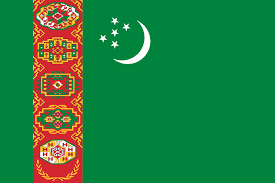Language/Turkmen/Grammar/Pronouns
Hi Turkmen learners! 😊
In this lesson, we will cover pronouns in Turkmen. Pronouns are used to replace nouns in sentences. Learning pronouns is an essential part of understanding Turkmen grammar. By the end of this lesson, you will be able to use pronouns correctly and communicate more effectively in Turkmen. Don't forget to practice with native speakers on Polyglot Club and ask them any questions. Let's get started!👍
Personal Pronouns[edit | edit source]
Personal pronouns are used to indicate the speaker, the person being addressed, or the person spoken about. Here is a table of personal pronouns in Turkmen:
| Turkmen | Pronunciation | English |
|---|---|---|
| men | men | I |
| sen | sen | You (singular) |
| ol | ol | He/She/It |
| biz | bɪz | We |
| siz | sɪz | You (plural) |
| olar | olar | They |
Here is an example of how to use personal pronouns in a conversation:
- Person 1: Men Turkmenistanyň adamy. (I am a citizen of Turkmenistan.)
- Person 2: Men de! (Me too!)
In this conversation, Person 1 uses the personal pronoun "men" to refer to themselves, and Person 2 responds with the same pronoun.
Demonstrative Pronouns[edit | edit source]
Demonstrative pronouns are used to point to specific objects, people, or places. In Turkmen, there are three types of demonstrative pronouns:
Bu[edit | edit source]
The pronoun "bu" indicates something that is close to the speaker. For example:
- Bu stol - This chair
Şu[edit | edit source]
The pronoun "şu" refers to something that is near the listener but not the speaker. For example:
- Şu gul - That flower
O[edit | edit source]
The pronoun "o" refers to something that is far from both the speaker and the listener. For example:
- O kitap - That book over there
Here is an example of how to use demonstrative pronouns in a conversation:
- Person 1: Bu ýer saýlawçylyk ýeri. (This place is a polling station.)
- Person 2: Şu ýagdaý saçygy. (That is a beautiful tree over there.)
In this conversation, Person 1 uses the demonstrative pronoun "bu" to refer to a place near them, and Person 2 responds with the pronoun "şu" to refer to a tree near the listener.
Reflexive Pronouns[edit | edit source]
Reflexive pronouns are used to indicate that the action of the verb is directed back at the subject. In Turkmen, the reflexive pronoun is "öz". For example:
- Men özüm bilen çaga edim. - I educate myself about children.
In this sentence, the reflexive pronoun "özüm" is used to indicate that the action of educating is directed towards the speaker.
Interrogative Pronouns[edit | edit source]
Interrogative pronouns are used to ask questions. In Turkmen, the following interrogative pronouns are commonly used:
Kim?[edit | edit source]
"Kim" means "who". For example:
- Kim bu? - Who is this?
Näge?[edit | edit source]
"Näge" means "why". For example:
- Näge böleri barada habar bermediler? - Why didn't they inform us about the meeting?
Näge?[edit | edit source]
"Näge" means "why". For example:
- Näge böleri barada habar bermediler? - Why didn't they inform us about the meeting?
Nire?[edit | edit source]
"Nire" means "where". For example:
- Nire gitmek isleýärsiň? - Where do you want to go?
Nähili?[edit | edit source]
"Nähili" means "how". For example:
- Nähili geçipdir? - How is it going?
Indefinite Pronouns[edit | edit source]
Indefinite pronouns refer to nonspecific people or things. In Turkmen, the following indefinite pronouns are commonly used:
Birnäçe[edit | edit source]
"Birnäçe" means "some", "several". For example:
- Onuň işgärleri birnäçe adamlara gowydyr. - His employees are good to some people.
Hiç kim[edit | edit source]
"Hiç kim" means "nobody". For example:
- Ýalňyzca hiç kim çykdy. - Nobody came out, only.
Her kim[edit | edit source]
"Her kim" means "anybody". For example:
- Her kim erbet ýaly işleýär bolýarsa, gürrüngi gün maýdansy öz baradaky sowklarymyz ýokary gaýtaryp bilersiňiz. - If somebody works badly, you can bring your own documents on the next day of demonstration.
Summary[edit | edit source]
In Turkmen, pronouns are used to replace nouns in sentences. Personal, demonstrative, reflexive, interrogative, and indefinite pronouns are all used in Turkmen conversation. Use this guide to learn how to use pronouns correctly and communicate more effectively in Turkmen. Don't forget to practice with native speakers on Polyglot Club and improve your Turkmen Grammar.👏
➡ If you have any questions, please ask them in the comments section below.
➡ Feel free to edit this wiki page if you think it can be improved. 😎
Sources[edit | edit source]
- Turkmen grammar - Wikipedia
- (PDF) A Grammar of Turkmen | David Gray - Academia.edu
- Turkmen language - Wikipedia
Other Lessons[edit | edit source]
- Some Continous Moods
- Adverbs
- Negation
- Question words
- The Subjunctive Mood
- Personal Pronouns
- Give your Opinion
- To have
- Questions
- Verbs

